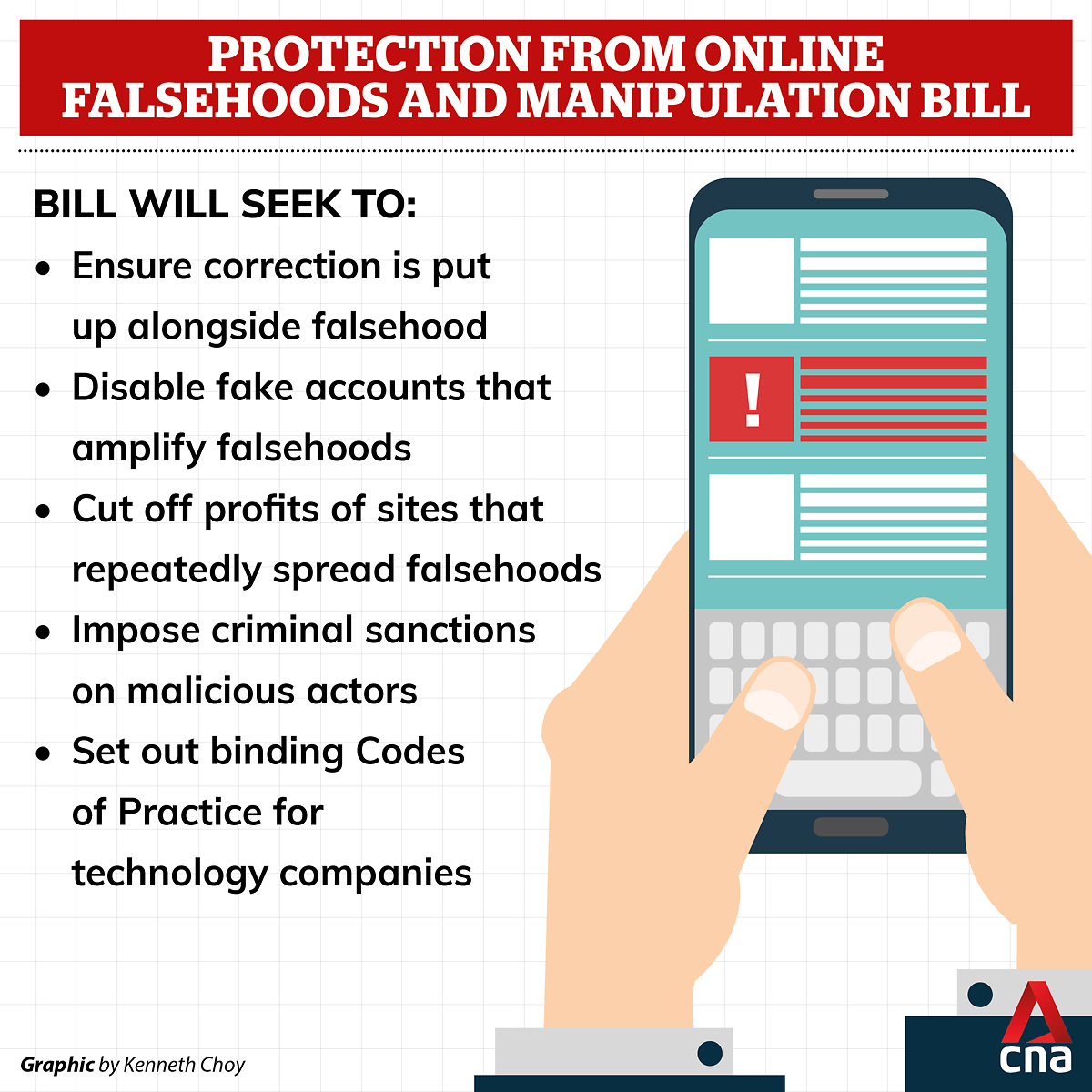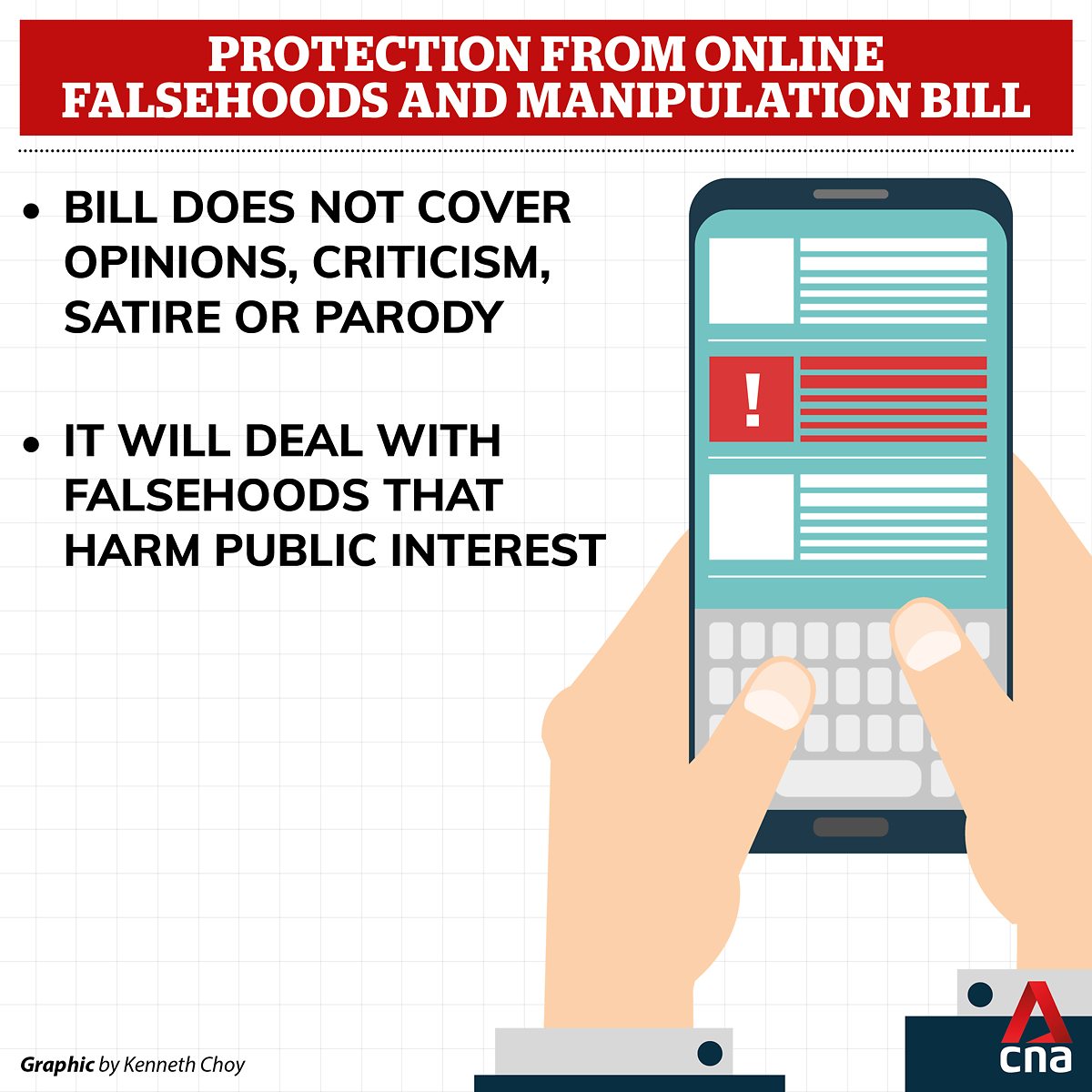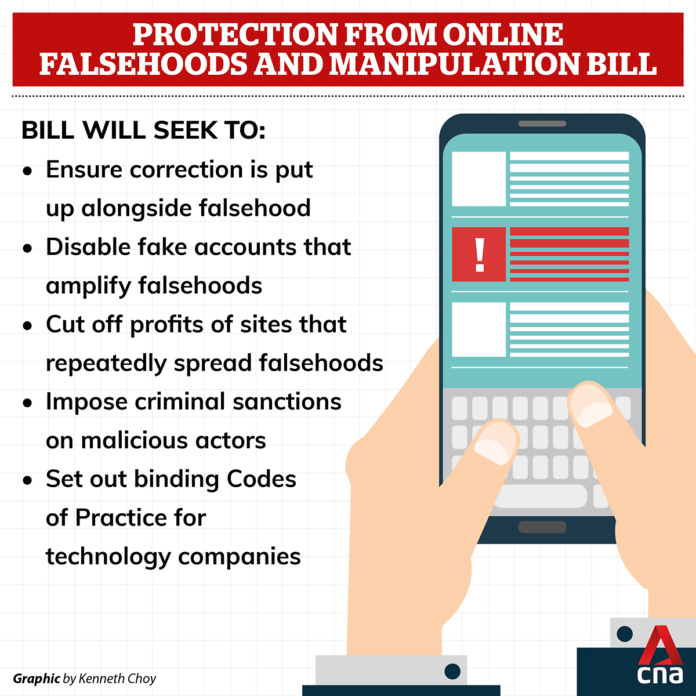SINGAPORE: The Protection from Online Falsehoods and Manipulation Bill will eventually become law.
With the Bill already tabled in Parliament for its first reading on Apr 1, it will get a second reading at the next sitting of Parliament, and thereafter, be passed into law.
It is therefore important that eyes be already set on the future, on how the Government will eventually implement and enforce the new laws in the first weeks and months after it comes into force.
With the expectedly deep political undertones in early criticisms and international scrutiny, each step that the Government takes will have fundamental impacts on its credibility – both domestically and internationally. At its core, shaping and assessing truths is about trust, and the Government will do well to be mindful that with its next steps, it could either gain or lose that currency.
The coming weeks and the next time Parliament considers the Bill should also not be seen as a foregone conclusion either. The Bill will be read a second and third time, and for such groundbreaking legislation, there is still much for legislators to do.
READ: Singapore Government rejects Human Rights Watch’s criticisms of new law targeting online falsehoods
READ: Internet trade body, Facebook ‘concerned’ over proposed law targeting online falsehoods
WILL GOVERNMENT OVER-REACH?
In its press release on the Bill, the Ministry of Law stated that “corrections will be the primary (emphasis added) response to a harmful online falsehood that is actively spreading”.
In a toolbox that includes various other tools from take-downs to disabling of inauthentic accounts and criminal sanctions, corrections – which are not criminal sanctions – are an admittedly calibrated option.
Questions, however, remain on the thresholds that the Government will have in moving from the “primary” action of corrections towards other tools in its toolbox.
In its sections dealing with the so-called “Correction Direction” and “Stop Communication Direction” mechanisms, the legislation does not currently provide any guiding criteria to dictate how decisions should be made on either route to take.
Absent such crucial information, the proof will only be in its implementation through policy and subsequent reviews.
In the meantime, while the Government has already taken pains to differentiate between falsehoods and opinion in outlining what would not fall under the ambit of the new law, more can be done to also clarify defining lines that may exist between falsehoods that will need correction versus those that will need to be taken down.
READ: Singapore proposes multi-pronged law to combat online falsehoods
READ: New law tackling online falsehoods not meant to create ‘chilling effect’ in public discussions: Edwin Tong
WILL THE GOVERNMENT UNDER-REACH?
On the flip side, eyes will also be on whether and how the Government deals with the daily drip-feed of inconsequential lies and misrepresentations that have come to define social media.
Will the Government intervene on a cleverly taken photograph that claims a block of public housing apartments has collapsed? Or will it intervene on another photo that shows a packet of non-halal meat residing in the halal shelves of a local supermarket?
The bar must be set high on what deserves Government attention, precisely to retain the requisite seriousness of the real issues that the legislation aims to address. As it stands, most casual lies and misrepresentations are often self-corrected by others on social media.
READ: Commentary: On falsehoods, clumsy corrections might backfire
THE SHAPE OF GOVERNMENT ACTIONS
The language defining “public interest” as a threshold for governmental action involves the following:
- Maintaining security
- Protecting public health, public safety, public tranquility or public finances
- Protecting foreign relations
- Protecting elections
- Preventing “incitement of feelings of enmity, hatred or ill-will between different groups of people”, and
- Preventing “a diminution of public confidence in the performance of any duty or function of, or in the exercise of any power by, the Government, an Organ of State, a statutory board” and their parts thereof
The scope is large, but by dint of its early actions, the Government will eventually reveal which of the above will be key priorities in tackling falsehoods.
It will do well not to be seen to overly lean on any one particular area of concern.
In particular, how the Government interprets the scope for its action in the last category will be carefully watched, with each step potentially politically charged.
As it seeks to address falsehoods via corrections, the new law also offers a unique opportunity for the Government to take a significant step forward in terms of transparency and openness.
For example, if a false statement is made in the form of an allegation, how far and how quickly will the Government move in providing information to the public to prove the contrary? To maintain trust in the process, the imperative must necessarily lie in erring on the side of providing more, rather than less information.

WILL THE GOVERNMENT MAKE MISTAKES?
As the Government seeks to correct and counteract falsehoods, the point has been reiterated that final decisions – where necessary – will be left to the courts.
In the draft legislation, the High Court will be able to set aside a Direction from the Government if: (i) the person concerned did not communicate in Singapore the issue concerned, (ii) it is not technically possible to comply, or (iii) the statement is not a statement of fact, or if it is a true statement of fact.
For the latter condition, there are therefore two grounds for the High Court to act: firstly, on interpretation, e.g. that the statement was found to be an opinion or satire; or secondly that upon further examination, the alleged falsehood was found to be true.
The possibility for decisions against the Government therefore exist, and where these do occur, will be of significant political signature.
In short, one court decision against a Government direction may be sufficient to cast doubt, and undermine trust in the enforcement of the new law.
The challenges for the Government are stark. As it ramps up its own internal processes and ability to detect and appropriately address fast-moving viral statements, it would do well to calibrate its reactions based on the range of considerations outlined above, and bear in mind the consequences of mis-steps and error.

WHAT CAN PARLIAMENTARIANS DO?
Even as the Government has its work cut out after the Bill’s passage, much work can still be done now, by legislators, before and during its second reading in Parliament.
For example, in lieu of another Select Committee which could now examine the legislative text, will legislators engage deeply on the specifics of the draft legislation, and provide not just deep arguments of principle based on the text, but delve into language and argue amendments when the Bill is committed to a Committee of the whole Parliament and read a third time?
There is no doubt clarifications can be made, and alternatives may arise.
A case in point is in the “General Interpretations” of the Bill, where:
- “a statement is false if it is false or misleading, whether wholly or in part, and whether on its own or in the context in which it appears”
As it stands, a statement will be false if it is false (a tautology) or misleading (potentially vague).
Besides dealing with the tautology, can more be done to provide clarity on what a “misleading” statement can be? For example, to address the range of benign or malign intents behind an intentionally deceptive statement versus one that might simply provide for differing interpretations.
There are other areas where clarifications might potentially be useful.
The Bill currently provides for a Minister to appoint an “alternate authority” – a public officer – to act on his behalf in exercising the powers provided under the Bill, during election periods, as well as at other times.
Can more be done to refine the language in this section to deal with potential conflicts of interest, e.g. if potential falsehoods involve a specific Minister, or are in fact published by any Minister?
READ: FAQ – How will the new law stop deliberate online falsehoods from spreading?
LOOKING TO THE LONG TERM
Given its fundamental importance, the Bill is one that Parliament must not only examine carefully, but equally importantly, be seen to examine it with due care.
Governments change, but the laws of the land are meant to endure, to be interpreted, implemented and enforced by different governments with different philosophies.
For example, while the Ministry of Law may, as a matter of policy, now aim to use corrections as its main course of action, how can the law protect against misuse by a different government in the future, formed by an altogether different party or type of party?
The Protection from Online Falsehoods and Manipulation Bill will also not only provide for the immediate purposes of dealing with false statements of fact, but will form an indelible part of Singapore’s legal system, and become the basis for future laws.
Any government and Parliament must necessarily have this long-term perspective in mind, as it deals with the current threat of online falsehoods.





